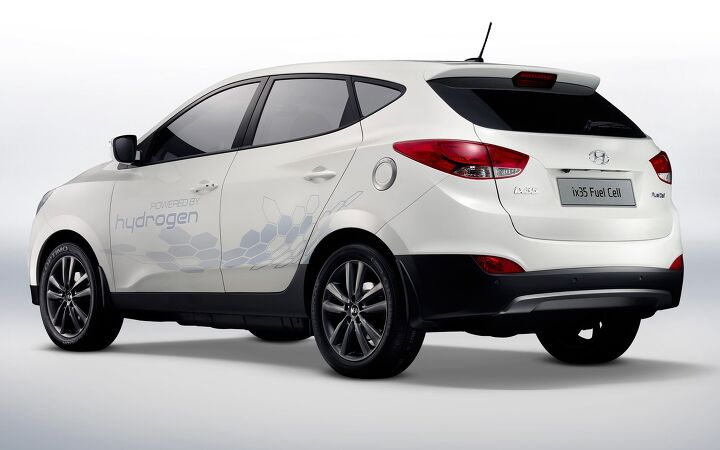Hyundai Gathers Tucson ZEV Credits For Future Internal, External Swaps
While the first hydrogen-powered Tucson FCVs left the docks in California in the last week of May, Hyundai knows the vehicles aren’t meant to add to the company’s bottom line, but are meant to garner credits for future use.
Ward’s Auto reports the Korean automaker will earn as much as 26 CARB credits for every Tucson FCV leased through 2017, each vehicle equal to $130,000 in credit. Fuel cell boss Byung Ki Ahn believes his company could then sell those credits to automakers in need of offsetting their carbon footprint, though Hyundai has no plans on the table to do so at this time, preferring to use the credits for themselves for less compliant vehicles of their own design.
In addition, the ZEV credits bestowed upon Hyundai’s hydrogen dream is more than than what EVs earn under California’s credit scheme, which earn less than half of what fuel-cell vehicles garner per unit sold. Ahn has no qualms with the scheme, though, viewing the credit market as “a good business model” for Hyundai and subsidary Kia to follow.
Seattle-based writer, blogger, and photographer for many a publication. Born in Louisville. Raised in Kansas. Where I lay my head is home.
More by Cameron Aubernon


































Comments
Join the conversation
A quick online check confirms that hydrogen used for transportation is an energy carrier, not an energy source. The hydrogen only stores energy created through processes that themselves consume resources, often substantial. It's akin to charging a battery. This certainly differs from actually producing energy like fossil, nuclear, and solar. (Thank you Wiki-you-know-who.) It's a distinction worth making, lest the water dripping from a fuel cell vehicle be mistaken for the elusive free lunch.
Does anyone know what's behind big government's enthusiasm for hydrogen cars? It doesn't make any sense. The level of "buzz" about hydrogen cars has been the same for 15-20 years, and they are no closer to being viable. Is big oil behind it, or is it a way to appear to be doing something while accomplishing nothing?
@brandloyalty (?) As you say it makes no sense whatsoever… to the consumer at least - as I am not a politician, nor a member of the BO Club, I can't speak for them. This article hints at one of the many reasons why car makers are so determined to pursue FCVs, none having the interests of mankind or the rest of our planet's inhabitants at heart. I don't know how much you know about H2 but I have read a lot about it and with the exceptions that it is very floaty and has a lot of energy stored in it, most of its characteristics are negative - certainly as far as using it as a fuel in a vehicle for the masses is concerned. Over the last 5 years or so, since I have been interested in EVs, I have left many comments on articles supporting H2 fuel cells all of which have been extremely negative. I have NEVER had a single rebuttal - certainly not one from anyone involved in whatever barmy scheme the article was discussing. I have concluded that the engineers and scientists concerned don't really care as long as they keep getting paid. Can't blame them for that but, really! Wouldn't you have thought *someone* with a vested interest and who knows what they are talking about would have bothered to have put pen to paper (finger to keyboard) to counter what I (and many others, obviously) have said that basically ridicules their life's work? The one obvious conclusion one has to come to is that the whole H2 fuel cell thing is an attempt - a vain, scrabbling last breath-type attempt - to maintain the status quo: to keep us poor plebs shackled to the millstone of Big Oil, their ghastly fossil fuel burning engines, all that 'added value' engineering in all those hundreds of highly engineered moving engine and transmission parts, all the consumables, the noise, the stink and everything else *bad* about ICEVs rather than either adapt (to making and selling EVs) or just bl%$dy *die*! Tesla is paving the way - a shining light for humanity to follow (assuming it doesn't get bumped off) - showing it is possible and profitable to make and sell EVs that are not only a match for the very best ICEVs but to better them by at least 100% (IMHO!). If you want to read more about the lunacy of H2 and FCVs look here - http://planetforlife.com/h2/index.html MW